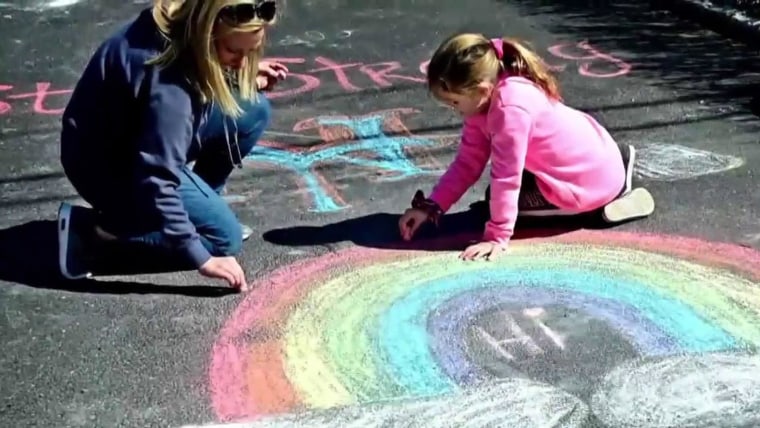At the beginning of the coronavirus quarantine, Kayelee Rock’s shy 5-year-old daughter Alice was resentful about the lockdown.
But now?
“She kind of adjusted a little too well,” Rock said. “Introverts like an excuse to be introverted.”
It’s a story that parents of more reserved kids have echoed across the country. While some children desperately miss their normal social interactions, others have happily retreated into their shells.
A certain amount of regression “is typical for all children because they’re experiencing uncertainty,” Michele Borba, an educational psychologist and author of “Un-Selfie,” told TODAY Parents.
Practice for re-entry: Drive to school and show kids where pickup will be, or practice having conversations with the dog.
Alice had been “really excited” and adjusting to Pre-K before the pandemic, her mom said.
“She has tended to regress, in that even when she has an opportunity to leave the house, she doesn’t because she’s gotten used to the isolation,” Rock explained to TODAY Parents.
Borba said while living with kids 24/7, it’s important for parents to stay patient and give introverted kids, and all kids, time to adjust to changes. She also recommends staying away from the label "shy."
"Very often, shyness is a temperament," she said. "If you label a child shy, they’re more likely to become shy. Just say things like, 'Oh it’s OK, you just need a little more time.'"
Meanwhile, Alice will stay home to stay safe — and plugged in.
“She’s just here and she’s having probably too much screen time,” her mom laughed. “That’s just her life right now.”
“I think when she goes back into the real world, that’ll be the test,” Rock said.
As kids re-enter the real world, Borba said it’s likely to be a tough adjustment for some.
“It’ll probably be an issue and it will be horrible,” she explained. “Almost every kid is a little more anxious.”
Tips for parents of introverted kids
Borba had the following tips for parents of introverted kids as things get back to normal.
1. Rehearse the return
Some kids might need more “wait time,” Borba explained, adding a group of kids at school might overwhelm them. So you can practice parts of the first day back before it happens.
“They need some warm-up time,” she explained. “So you can rehearse the first thing… like putting your foot outdoors or walking down the driveway.”
She suggested driving to school and showing kids where pickup will be or practice having conversations with the dog.
2. Wean yourself away from the child
“If the child is really used to you sitting there, your goal is to wean yourself,” she said. “If you’re sitting side by side with that child, you can pretend you’re doing something else. You’re making sure they’re confident and you gradually start pushing back so they could do it on their own.”
She added if kids get too used to having a parent at their side, even in things like Zoom calls with their teacher and class, that can become a “bad scenario.”
“You want them to be self-sufficient,” she said.
3. Have a positive self-talk mantra
From “I’ve got this” to “It’ll get better,” having a mantra or coping strategy can help some kids. Borba suggested calling it a family mantra and saying it often around the house so they pick up on it.
“You’ve got to repeat it so often they’ll hear it inside their heads,” she explained.
4. Teach kids to recognize the signs of anxiety
Start spotting your kids’ stress signs and point them out so they can recognize them on their own. If they know they’re about to take a deep dive into anxiety, they can start using some of their coping techniques.
“Ask them if they’re getting really upset and then tell them to take a slow, deep breath,” Borba recommended.
5. Show them “belly breaths” for calming down
Tell them to think of it as “smelling a flower, blowing out birthday candles,” Borba said. She also suggested sitting back to back with your child and linking arms while practicing deep breathing.
“They’ll feel it and start to get the idea,” she explained. “They’ll get it and it’s wonderful and you’ll be a lot more relaxed.”
Borba added that helping kids de-stress will help parents, too.
“Make it a habit!” she said. “Usually it takes around 21 days … just keep working on it in slow, fun little ways until you see your child has got it.”
“We’re so stressed so our kids are stressed, and one of the best things about all of this is that if you teach these strategies to your kids, it’ll help your own stress levels go down.”
Read more: Why the pandemic is so hard on parents
Related video:











